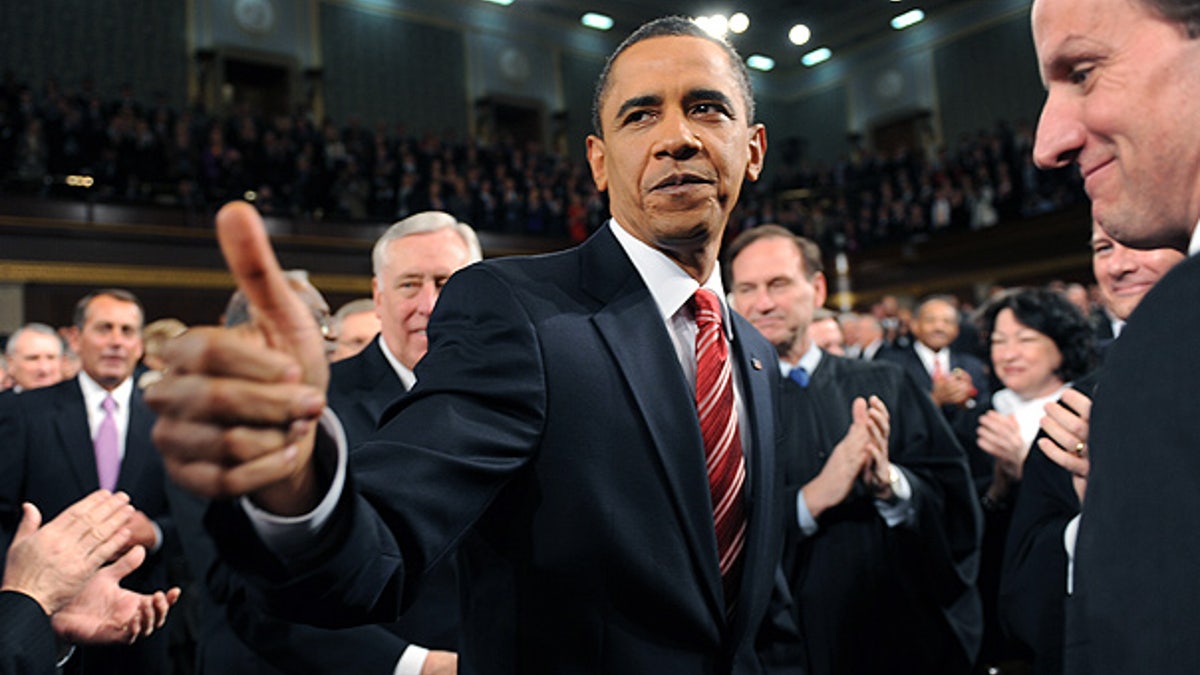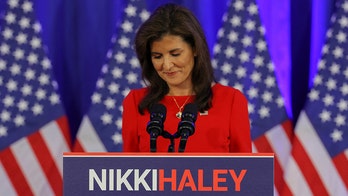
Jan. 27: President Obama greets members of Congress on his way to deliver the State of the Union. (AP)
President Obama renewed virtually all his campaign promises in the State of the Union address Wednesday night. Now he's got to deliver.
The road to restoring public confidence in Washington and in his ability to lead it starts Thursday in Tampa, where Obama will hold a town hall meeting and discuss federal investment in mass transit. The visit comes as the president vows to make the economy and jobs creation his top focus in 2010, while continuing to press ahead with his ambitious agenda on everything ranging from health care reform to education to immigration reform.
"We have finished a difficult year. We have come through a difficult decade. But a new year has come," Obama said. "We don't quit. I don't quit."
The president took the podium at a vulnerable time for his agenda, his party and his relationship with Congress.
Health care reform, which earlier this month seemed on the verge of final passage, screeched to a halt last week after Republican Scott Brown won election to the U.S. Senate in the seat formerly held by the late Sen. Ted Kennedy. The victory broke the Democrats' supermajority in the Senate and heightened the party's anxiety over the November midterm elections.
Obama on Wednesday urged Congress and the American people to stick with him on health care reform and other initiatives, as he lamented the coarse nature of politics in Washington and suggested that tension was eroding the public's faith in government.
"I campaigned on the promise of change -- change we can believe in, the slogan went. And right now, I know there are many Americans who aren't sure if they still believe we can change -- or that I can deliver it," Obama said. "But remember this -- I never suggested that change would be easy, or that I could do it alone."
Playing the role of Washington outsider, the president said it's time to put away the partisan "schoolyard taunts" and work together toward achieving reforms he says the American people need.
On health care, the president said he would not "walk away" from the issue and urged Congress to take "another look" at the plan on the table.
"Do not walk away from reform. Not now. Not when we are so close," Obama said. "Let us find a way to come together and finish the job for the American people."
Obama took partial responsibility for the near-collapse of talks while leaving the details of the road ahead for another day.
"I take my share of the blame for not explaining it more clearly to the American people," Obama said. In a gesture of bipartisanship, Obama said he's open to new ideas that will bring down premiums and cover the uninsured. He also said he's going to start monthly meeting with leaders from both parties.
But the centerpiece of Obama's address was jobs creation. The president called on Congress to pass a new jobs bill right away, telling the Senate to pass something similar to the bill passed by the House last year as its "first order of business."
"People are out of work. They're hurting. They need our help. And I want a jobs bill on my desk without delay," Obama said.
Obama called for $30 billion from repaid Wall Street bailout funds to be directed toward helping community banks lend to small businesses. He pitched a new tax credit for small businesses that hire new workers and a tax incentive for businesses that invest in new plants and equipment. Plus he called for the elimination of all capital gains taxes for small business investment.
Obama said the "devastation" of the economic crisis remains, but also defended his approach so far, saying his administration acted "immediately and aggressively" to stave off a "second depression."
The president emphasized that conditions would be worse if his administration and Congress had not approved the stimulus package last February. He said the package has saved 2 million jobs.
He also defended the $700 billion Wall Street bailout, calling it unpopular but necessary.
"It was not easy to do," he said. "I hated it. ... You hated it. It was about as popular as a root canal."
The president spoke for about 70 minutes, and was interrupted nearly 90 times by applause.
Obama coupled his call for stimulating job growth with a call for cracking down on "recklessness" on Wall Street. He urged Congress to pass financial regulatory reform, which the House has already approved. Obama threatened to veto any bill that "does not meet the test of real reform."
On education, Obama backed a plan to give families a $10,000 tax credit for four years of college and an increase in Pell Grants, along with other proposals aimed at making higher education more affordable.
Obama kept pressure on Congress as well to pass a "comprehensive energy and climate bill," though such a bill has stalled in the Senate after passing the House.
He devoted relatively little of the speech to foreign policy and national security. In a brief section on international matters, he said Iran will face "growing consequences" if it fails to curb its nuclear program. And he said "far more" Al Qaeda operative have been killed under his watch than in the previous year.
Obama took one fairly direct shot at his predecessor George W. Bush, as he urged the American people not to buy into calls for less regulation and more tax cuts for the wealthy.
"That's what we did for eight years. That's what helped us into this crisis. It's what helped lead to these deficits. We can't do it again," Obama said.
The deficit has greatly expanded under Obama's watch, and Republicans were not shy to point out this fact in response.
"There is just no amount of spin and blame shifting that can hide the fact that tonight the president added more zeros to an already burdensome deficit with no explanation as to how he would pay for this 'new foundation,'" Republican National Committee Chairman Michael Steele said in a statement.
In opening his address, Obama compared the challenges he and the country face to historic setbacks like the Great Depression and the start of the Civil War, but said the American people are being "tested" and must "answer history's call."
Obama also outlined new transparency requirements for lobbyists, called on Congress to draft legislation undermining the recent Supreme Court decision striking down campaign finance restrictions and called for earmark reform.
He also pushed anew for immigration reform, something that has been on the backburner as Congress hunkered down for the better half of the last year to deal with health care reform. And he called on Congress to repeal the "don't ask, don't tell" policy prohibiting gays from serving openly in the military.
"It's the right thing to do," Obama said, pledging to address the issue "this year."
Obama also proposed a freeze on some domestic spending for three years, a move some Republicans call lip service to the idea of fiscal discipline. Obama assured Congress he was serious Wednesday, though lawmakers in the audience laughed when he said the freeze wouldn't take effect until next year.
"If I have to enforce this discipline by veto, I will," Obama said.
Virginia Gov. Bob McDonnell, who delivered the GOP response Wednesday night, applauded the partial freeze proposal in his speech but called for much more belt tightening.
"The president's partial freeze on discretionary spending is a laudable step, but a small one. The circumstances of our time demand that we reconsider and restore the proper, limited role of government at every level," he said.
Brown said in a written statement the president needs to "cut spending and not just freeze it."




